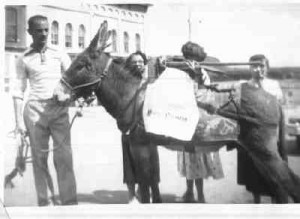Column by George Sibley
Politics – July 2004 – Colorado Central Magazine
IT’S AN ELECTION YEAR, in case anyone hasn’t noticed, and all kinds of wild cards are coming out in what could be lumped together as “the American media” — those conduits through which our public and private discussions and arguments are channeled and shaped into what communications analyst James Carey called “the conversation of the culture.”
So on the one hand, we’ve got Michael Moore’s “Fahrenheit 911” docudiatribe about Dumb and Dumber, and we’ve got a bad movie (according to all the reviews I’ve read) about a good topic, the potential imminence of global warming; and on the other hand, we’ve got the mythologizing of Rush Limbaugh and all the Fox “we distort you decide” guys, and now, a new book called Hard America, Soft America: Competition vs. Coddling and the Battle for the Nation’s Future.
The author of Hard America, Soft America is Michael Barone, variously described as “America’s foremost political analyst” (George Will) and a “Fox commentator,” as oxymoronic a set of descriptors as can be imagined. Barone’s argument is that American culture is in tension between the proponents of a “soft culture” that “coddles” people and leaves them essentially incompetent, and a “hard culture” that teaches people what life is really like and shapes them up through exposure to the toughening virtues of competition.
I haven’t read all of Barone’s book, just the Introduction, but that is more than a lot of people will have read who will start soundbiting the hell out of just the book’s title in the coming election because Barone’s premise, the less you think about it, becomes a rationale for re-electing a media-tough guy like George Bush. Barone says of the book in the introduction that “unlike most of my other books, it is not primarily about politics.” But when your title balances a nice objective descriptor like “competition” with a nice subjective descriptor like “coddling,” I think we have begun in the muck of politics, no matter how the author tries to scramble for higher ground.
Barone launches into his analysis with a question, wondering how it is that America produces so many “incompetent 18-year-olds” that, by the time they are 30, “are the most competent people in the world.” Suspend, for the moment, whatever disbelief that statement about 30-somethings engenders in your mind, and assume it to be a reasonable perception. To what does Barone attribute this perception?
“From ages six to eighteen Americans live mostly in what I call Soft America — the parts of our country where there is little competition and accountability. But from ages eighteen to thirty Americans live mostly in Hard America — the parts of American life subject to competition and accountability. Soft America coddles: our schools, seeking to instill self-esteem, ban tag and dodgeball, and promote just about anyone who shows up. Hard America plays for keeps: the private sector fires people when profits fall, and the military trains under live fire.”
THAT PARAGRAPH pretty well lays out Barone’s parameters for “hard” and “soft”: any system or situation that does not emphasize “competition and accountability” is “soft”; any situation that emphasizes those is “hard.”
Unlike his title, the book hedges the starkness of his judgment. “I do not take the view that all Softness is bad,” he says: We don’t want to subject kindergartners to the rigors of the Marine Corps or to leave old people helpless and uncared for. Many Americans seek jobs in Soft America so that they will have time for raising their families and participating in community organizations, activities that provide American society with much of its strength and special character. It would be a cruel country that had no Soft niches.
One hopes that Rush Limbaugh and his colleagues will read that far beyond the title before bellowing the message which is pretty explicit in “competition vs. coddling,” but I doubt that will happen.
Despite that mild disclaimer, however, Barone follows it by asserting his allegiance: “We have the luxury of keeping parts of our society Soft only if we keep enough of it Hard.” Social Security, social safety nets, public schooling that tries to encourage collaboration and critical thought as approaches to problem-solving, the GI Bill of Rights, and any of the other accouterments of “a culture in which lawns, jobs, and retirement checks all [seem] like entitlements” are luxuries that can only occur in a society sufficiently “Hard” (his caps).
Well, society does seem to organize its political discourse around dialectics like this one, and I will probably read on to find out how, or if, Barone answers the questions boiling up in my mind. Questions relevant to Central Colorado, like:
¨Is it “hard” or “soft” to be educating our kids about energy alternatives because someday (their day probably) we will be in the last dregs of the “Petroleum Interval”?
¨Is it “hard” or “soft” for the government to be subsidizing petroleum and petroleum exploration to the extent that it keeps energy alternatives from becoming “affordable”?
¨Is it “hard” or “soft” for people in resort economies to be pushing for environmental protections against environment-disrupting industries or activities? (Are resort economies “hard” or “soft”?)
¨Is it “hard” or “soft” to want values other than dollar values to guide the distribution and use of water in Colorado?
¨And on the larger front, is it “hard” or “soft” to do away with the inheritance tax and the progressive elements of the income tax, thus recreating the permanent aristocracy (uncompetitive and unaccountable) we supposedly tried to transcend here 200-some years ago?
¨Which leads to this question: Is there any individual in America who has lived a softer, more coddled life than the banty little man-child Barone’s book will probably help re-elect?
¨And a final question for Barone: Is an egg “hard” or “soft”?
George Sibley lives in Gunnison and teaches at Western State College, where he also organizes seminars and workshops.


